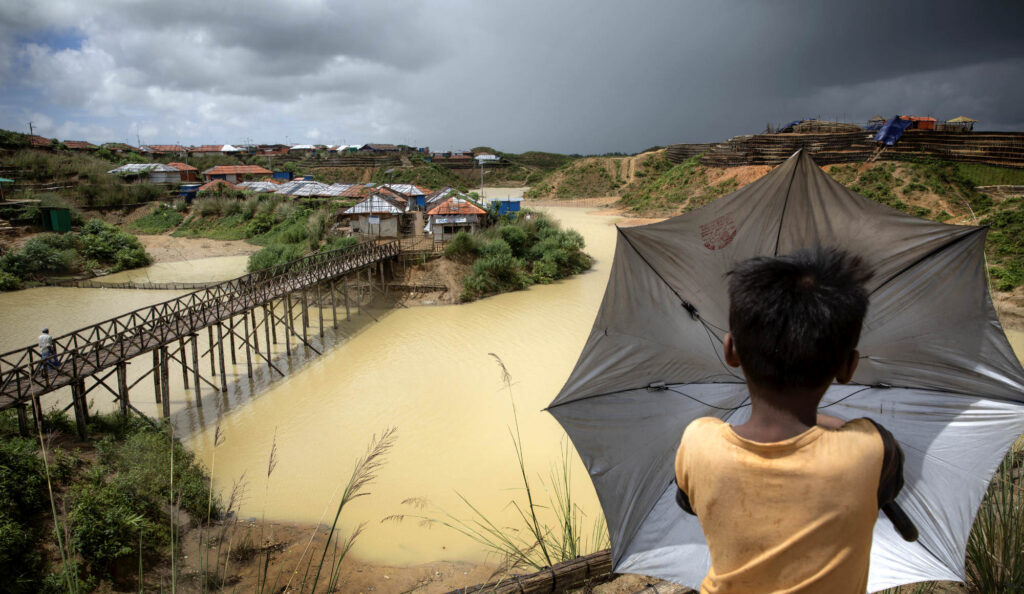Updates & Press
Mission | September 23, 2020
Climate Change: Creating and Exacerbating Humanita
Author | MedGlobalComms

By Andrew Moran, Policy and Advocacy Intern at MedGlobal
The year 2020 will be remembered as the year COVID-19 swept across the world, crippling health systems and creating economic and political crises. However, the devastating and compounding effects of climate change will undoubtedly define the twenty-first century. One of the predicted effects of a shifting climate will be even higher levels of mass displacement and instability around the world. Refugees, migrants, and other vulnerable populations that lack the resources to withstand climate crises will inevitably suffer the most.
In many regions already facing dire humanitarian crises, heavy rains and longer monsoon seasons are causing historic flooding. The MedGlobal field teams in Bangladesh, Sudan, and Yemen are witnessing this firsthand. In July, one-third of Bangladesh was submerged under water, affecting over 4.7 million people. MedGlobal’s report In the Eye of the Cyclone warns that the 900,000 Rohingya refugees in Cox’s Bazar live in low-lying areas that are prone to flooding and mudslides. This places them at high risk of both displacement and contracting water-borne illnesses. Nationwide flooding in Sudan has created similar dangers. In September, Sudan’s government declared a state of emergency after weeks of deadly flooding physically isolated communities and left half a million people homeless. MedGlobal’s Program Manager for Sudan, Abduelsamad Abdalla Ahmed, reported on the flooding in Khartoum saying:
“The floods in Sudan are the worst they’ve been in thirty years. Not only are the floods displacing and killing people, but we are very worried about an outbreak of diseases. The situation is out of control.”
Widespread flooding in war-torn Yemen, where 80% of the population is in need of humanitarian assistance, has also exacerbated the health crisis. Since 2017, powerful monsoon seasons and massive flooding has contributed to over 2.1 million cases of cholera. Dr. Nahla Arishi, a pediatrician in Aden, noted in MedGlobal’s recent report A Tipping Point for Yemen’s Health System that flooding also hindered the COVID-19 response as many Yemenis misattributed their coronavirus symptoms to flood-related diseases. Like in Bangladesh and Sudan, the people of Yemen have also suffered mass displacement. As of August, over 300,000 people, many of whom were previously displaced and living in extreme poverty, have lost their homes due to flooding. Moving forward, as climate change continues to intensify annual monsoon seasons, once-in-a-century floods may occur every decade and the lives of millions of people may literally be washed away.
A warming planet has also exacerbated food insecurity for millions of people and raised the spectre of entire regions becoming inhospitable. For many crops and livestock, as temperatures rise, the overall production and nutritional quality of the food falls. In 2012, unprecedented droughts among major food exporters caused food prices in several countries in sub-Saharan Africa to double and triple. This has dire consequences for low-income households that often spend up to 75% of their income on food. Furthermore, a report by the World Bank estimates that global crop yields may fall 5% by 2030 which, compounded with the burden of intensified natural disasters and disease outbreaks, will push 100 million people into poverty. Millions more may be forced to abandon their homes as climate change makes them uninhabitable. By the end of the century, heat waves during the summer months may transform parts of the tropics and the Middle East into areas unable to sustain human life. Mass migrations have already begun and over one billion people are expected to be displaced by 2050.
There is no quick, easy, or single solution to avoid the calamitous effects of climate change that we are on course to encounter. It is essential, therefore, to prepare for the mass displacements and humanitarian crises that climate change will create and exacerbate. Many of the countries where MedGlobal works are already grappling with the effects of climate change. While it is critical for the international community to ultimately find the willpower and ingenuity to avert the worst effects of climate change, investing in climate resistant infrastructure, adapting operations, and developing extensive response networks as part of our work is crucial for long-term engagement.
This blog post was written by Andrew Moran, Policy and Advocacy Intern at MedGlobal. Andrew has a BA in Political Science from Yale University.


